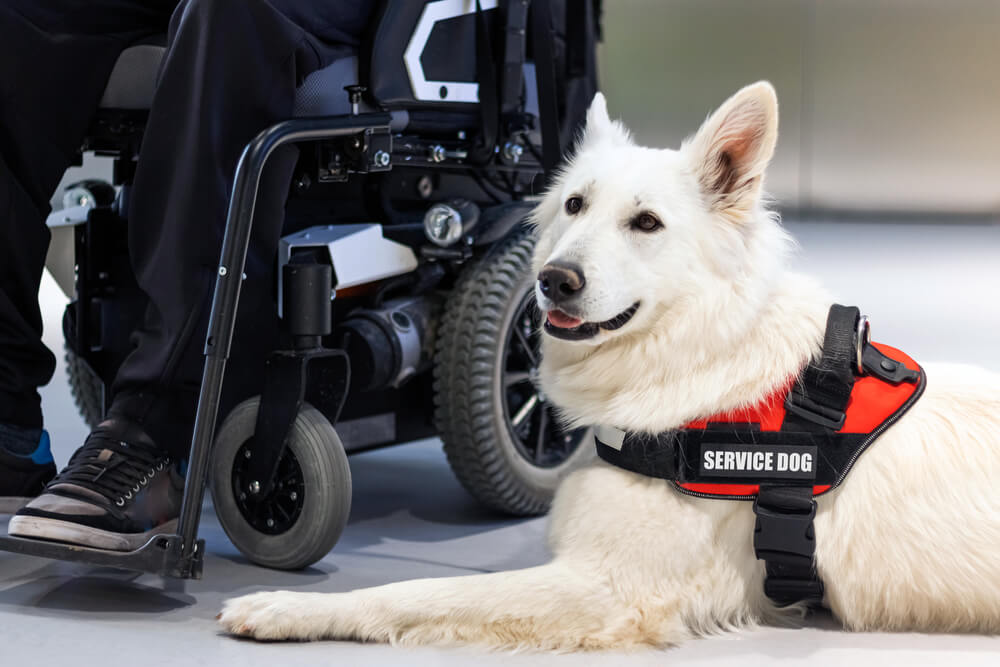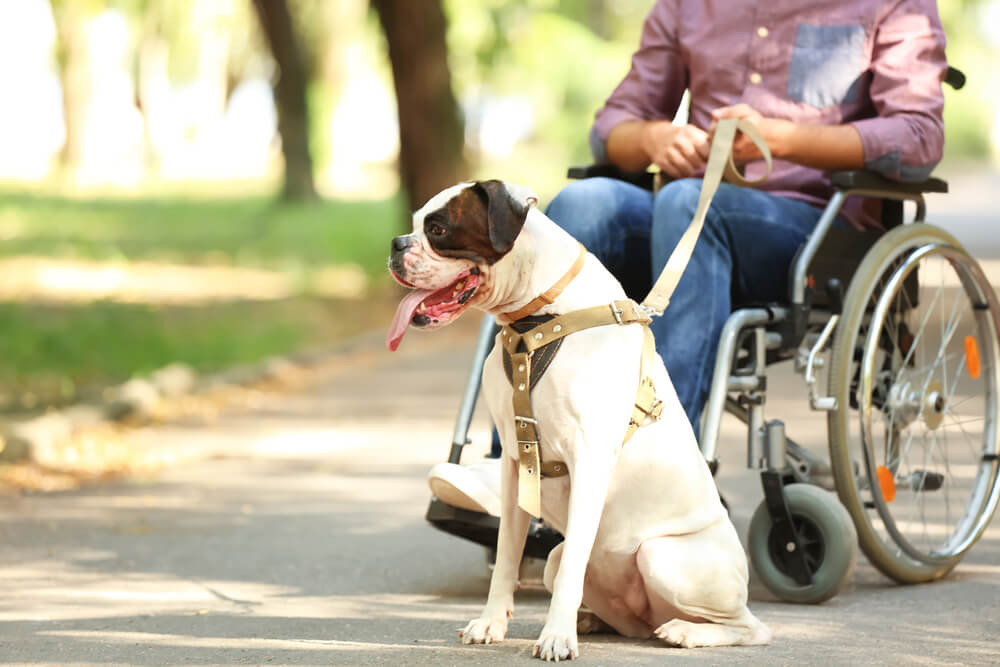Service dogs and emotional support dogs can offer amazing help to people of many different backgrounds. While both of these types of dogs are equally amazing, there are some major differences between the two.
To put it most simply, service dogs provide a specific service for people that helps them live with a disability more easily. Emotional support dogs, on the other hand, do not provide any specific service to a person as a service dog does.
If the difference between these two classifications is still a bit confusing, don’t worry. We will be explaining everything that you need to know about the differences right here in this article.
Let’s get right to it.
Why do People Have Service Dogs?

People have service dogs to help them manage life with a disability more easily. A great example of a service dog is a guide dog for the blind. The dog has learned a series of skills that ultimately allows them to guide a person without sight around safely. They are usually also trained to bring objects to their visually impaired owner on command.
There are more types of service dogs than just guide dogs, though.
Some service dogs help those with mobility issues by giving them objects and helping them when they fall down. Other service dogs alert their owners of oncoming seizures, detecting low blood sugar or fainting spells.
As long as the dog has been trained to perform a specific task to help a handler with a disability, they are a service dog.
Why do People Have Emotional Support Dogs?

Emotional support dogs, also referred to as ESAs, help their owners as well, but this is not in the same way that service dogs do.
Instead of being trained to perform a specific task for their owner, the mere presence of the emotional support dog provides their owner with comfort.
For the most part, emotional support dogs are reserved for those with mental health conditions such as anxiety or depression.
What are the Differences Between Emotional Support Dogs and Service Dogs?

There are more differences between service and emotional support dogs besides function.
Knowing all of the ways that the two are different can help you discover if you need a service dog or if you need an emotional support dog instead.
Below is a chart with all of the key differences between these two classifications.
Do you need official registration?
No, but specialized training is required.
Yes, a letter from a licensed mental health professional.
Anywhere. As long as the dog has specialized service dog training, they are a service dog.
Any dog can technically be an emotional support dog.
Can they aid a disability by performing specific tasks?
Can they provide emotional support?
Are there laws protecting them?
Do they need specialized training?
Yes, training to perform the service for their handler.
No, but they should have basic obedience training and be well-behaved
Can you take them into public places with you?
Not unless they allow dogs
Can you take them on public transportation?
Generally no, unless they allow dogs
Can you be denied housing because you have one?
Can you be denied a stay at a hotel because you have one?
Yes (unless pet friendly)
Hopefully, this chart clears some things up.
Emotional support animals are generally better for people who do not need a dog to help them get through certain situations or tasks. All that is needed for an emotional support animal is a letter from your mental health professional stating you need one.
You do not need to purchase any registration to legally own an emotional support animal or service dog in the United States. There are some companies offering them for a fee, but they are not legally necessary.
However, placing a vest on a service dog stating their purpose can help you two navigate the world with fewer questions.
Service Dog Vs. Emotional Support Dog Laws
As we have mentioned previously, there are federal laws protecting both service dogs and emotional support animals in the United States. This means that these laws count no matter where you are in the country.
However, these laws are technically different and promise different rights to service animals than they do to emotional support animals.
Here’s what these laws are and what they mean to you in more detail.
The Fair Housing Act
The fair housing act was amended in 1988 to include individuals with disabilities. This means that a person with a service dog or an emotional support dog cannot be denied housing because of their dog. For emotional support dogs, you may need to present your letter from a mental health professional stating your need for an emotional support animal. However, you can still be denied housing if your dog is destructive or aggressive.
The Air Carriers Access Act
The air carriers access Act was instated in the 1980s as well, and it states that a person with a service dog cannot be denied access to air travel. Their service dog cannot be denied access either. This means that a service dog can sit in the cabin with their handler to provide their service.
An important thing to note is that the air carriers access act used to apply to emotional support animals as well. However, as of January 2021, this no longer applies. This means that weight limits and pet fees do count for emotional support dogs, and you cannot take an emotional support dog onto a plane no matter what.
As a result, it is a good idea to always double-check an airline’s pet policy before traveling with an emotional support dog.
The Americans with Disabilities Act
The Americans with disabilities act is possibly the most important law protecting service dogs specifically. This law reinstates that those with a disability cannot be discriminated against, not even for their service dog.
This extends past the right to housing and public transportation access.
The ADA states that service dogs should also be allowed in places that do not typically allow pets such as public stores and even restaurants. This is as long as the service dog is well behaved and not destructive.
Considering that service dogs should be incredibly well-trained, this shouldn’t be a problem.
Service Animal vs. Emotional Support Animal FAQs

Are Emotional Support Dogs Certified?
There is no certification needed for emotional support dogs. All you will need to have an emotional support animal is a letter from a licensed mental health professional such as a psychiatrist stating that you need one. Any other certification is not legally necessary, but some people find it helpful.
Do I Need an Emotional Support Dog or a Service Dog?
That depends on if you would need a dog to perform a specific task for you or not. Most people with physical disabilities such as vision or hearing impairment need a service dog. The same goes for those with invisible disabilities where their dog can alert them of an imminent health concern or those with mobility issues.
While there are psychiatric service dogs, they do still need to perform a specific service for their handler. For many people with mental health conditions, this could entail providing pressure for comfort or reminding them to take medicine. If you need a dog to perform a task for you, then you need a service dog.
Emotional support dogs do not perform specific tasks, and they do not require specialized training. However, having an emotional support dog can still be extremely beneficial. If your dog provides you with important comfort, but you do not need them to do anything for you physically, then you should consider having them as an emotional support dog.
Are bully breeds good service dogs?
If properly trained and socialized, bully breeds such as pit bulls can make excellent service dogs. It is important to note, however, that some organizations and public places may have breed restrictions in place that prevent certain breeds from being used as service dogs.
Can You Take Emotional Support Dogs Into Stores?
No, you cannot take an emotional support dog into a store unless the store allows pet dogs. Only service dogs are allowed in public spaces that would not otherwise allow dogs. This is because oftentimes those with disabilities need their service dog with them at all times for their safety. This is why service dogs are protected under the ADA and emotional support dogs are not.
Can Any Dog be an Emotional Support Dog or Service Dog?
Any dog can technically be an emotional support dog. However, it helps to have an emotional support dog that is well trained and socialized. This is because the laws protecting emotional support animals can be revoked if they are aggressive or cause damage. At a minimum, housebreaking your emotional support dog and doing some basic obedience training is a good idea.
Service dogs need to receive specialized training to be able to perform the desired tasks successfully. This training will differ depending on the type of service dog. They also need to be calm in public and not cause safety concerns. Any dog that meets these requirements can be a service dog.


